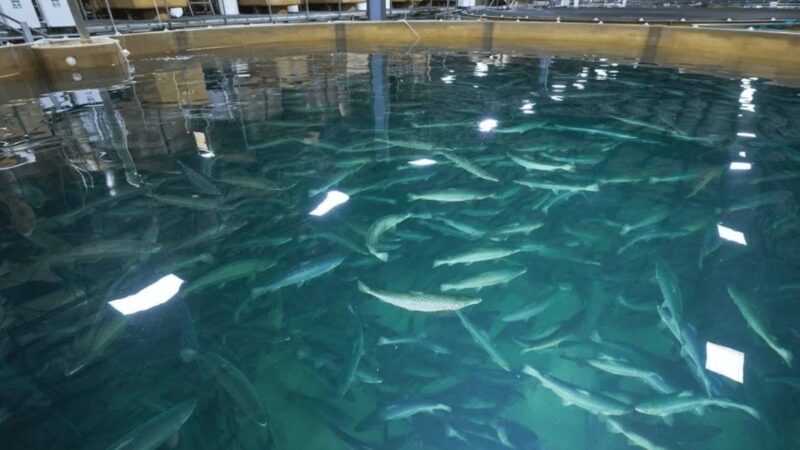Activists dish out $100,000 for anti-aquaculture election campaign
As land-based salmon farmers around the world face a financial bloodbath, activists push federal election candidates to support the immediate transition of maritime aquaculture operations in BC to onshore tanks.
By Fabian Dawson
SeaWestNews
Activists opposed to growing salmon in ocean-based farms have spent close to $100,000 on a social media campaign urging candidates in the upcoming federal election to support moving maritime aquaculture operations in British Columbia to land-based tanks.
They are asking candidates to publicly pledge “support for a continued transition away from open net pen salmon farms in the coastal waters of British Columbia, with appropriate incentives to transition the industry to land based closed containment aquaculture by 2025.”
The campaign is paid for by a group based out of Sointula, BC, called the Canadian Coastal Research Society, whose directors list no fisheries science credentials.
“As expected the campaign is science deficit targeting candidates with falsehoods about today’s salmon farmers to get urban votes,” said a Victoria-based political pundit, familiar with BC’s salmon farming industry.
“What they are not telling voters, candidates and donors is that the technology for successful and sustainable large scale land-based salmon farming to replace ocean-based farms is still years away…nobody has done it and the people who say it can be done are the people who haven’t done it,” he said.
“They also hide the fact that several government scientific studies have shown that salmon farming in BC’s oceans has less than a minimal impact on wild stocks.”
Pointing to the recent setbacks faced by Atlantic Sapphire, the leading land-based aquaculture company in the world, veteran fish farmers in BC have said that the people behind the mega land-based farms are mostly about raising money, not raising fish.
“And they are failing on both fronts,” said one fish farmer.
Atlantic Sapphire which has been the go-to example for the activists, who insist that land-based salmon farming can immediately replace ocean-based salmon aquaculture on Canada’s west coast, recently announced that it had suffered a net loss of USD 51.5 million in the first six months of 2021.
This triggered a share price crash wiping $250 million off Atlantic Sapphire’s market cap as analysts said the company is now worth $1 billion less than it was just 6 months ago.
Intrafish reported that the recent share price falls experienced by Atlantic Sapphire appear to show that 2021 could be the year investors turn away from the high-flying stocks of land-based salmon farmers.
Collectively since the start of the year, the world’s major land-based farmers, most of them listed on the Oslo Stock Exchange, have seen their market caps collapse by nearly $1 billion, the seafood industry news site said.
The RAS (Recirculating Aquaculture System) market has been hyped in the past 2-3 years, with many jumping on the band wagon, said land-based salmon farmer Nordic Aquafarm.
Stock prices have soared long before capabilities have been proven in new companies – that tends to generate a bubble in any industry, it said.
Intrafish also reported that six out of seven publicly traded land-based firms have seen their share price slide in 2021.
Among them are Proximar Seafood, which has seen its share price plunge 57 percent, AquaBounty, whose shares are at half the level as they were at the start of the year and Kingfish Company, which has seen its share price drop 30 percent in the opening eight months of 2021.
Several other studies, from government, industry and scientists have shown that growing fish on land to market size will impact climate change, at a greater pace.
The studies have also shown land-based farms will leave a damaging ecological footprint due to high power consumption and land use or that growing just 75,000 tons of salmon would require 4.16 billion litres of water just to fill the tanks.
A global report on The Evolution of Land-based Atlantic Salmon Farms shows that farming Atlantic salmon in their natural environment — the ocean — is the responsible way to farm.
Other challenges to land based RAS grow-out facilities include the global shortage of a trained workforce, fish health, broodstock development, stocking densities, and financial risks, according to The State of Salmon Aquaculture Technologies study released in February 2020.
The BC Salmon Farmers Association said land-based salmon farming currently has significant challenges which need to be addressed before it becomes a viable option for full scale commercial production.
“At present, the land-based “movement” still has to deal with issues like energy consumption, water rights/use, market acceptance, cost of production, and—while strides have been made in this area—so-called “off-flavours” are still an issue,” said Jim Parsons, the president of the Northwest Aquaculture Alliance (NWAA).
(Image courtesy of AquaBounty)

